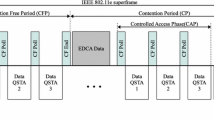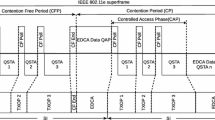Abstract
The IEEE 802.16 standard (namely WiMAX) is proposed to support QoS-aware transmission of real-time service in Wireless Metropolitan Area Networks (WMANs). WiMAX also can operate as a wireless backbone, and then cooperates with WiFi to form a heterogeneous wireless network. Thus, hot spots of WiFi belonging to different WiMAX networks can communicate with each other. For achieving that a Base Station (BS) serves a large number of Subscriber Stations (SSs), WiMAX uses a centralized polling access mechanism instead of a random access mechanism. WiMAX thus avoids occurring access collisions but causes long polling delay under a high-density SSs situation. Consequently, IEEE 802.16 does not schedule real-time service (rtPS) while the BS is in multicast polling mode. This problem of long polling delay becomes worse when the BS serves high-density SSs, because the BS only polls some SSs or groups in every frame time. This paper thus proposes an adaptive polling approach with a cross-layer mechanism, which dynamically polls SSs among different polling modes while continuously supporting the rtPS service. The approach consists of two phases. The first phase adopts two hysteresises of number of SSs and residual bandwidth to determine the optimal polling mode for each connection. The second phase presents a novel QoS-aware rtPS service (QrtPS) that provides an Average Delay requirement instead of the Maximum Delay requirement to take over the rtPS service when a SS is polled by the multicast mode. Additionally, a cross-layer mechanism is proposed to achieve that the real-time applications can be sent with a high-quality or low-quality video codec when the SS is in unicast or multicast mode, respectively. Numerical results demonstrate that the proposed approach significantly outperforms IEEE 802.16 in average delay and network utilization. Furthermore, the collision probabilities of using different numbers of contention slots of an uplink subframe and different numbers of groups within a BS are evaluated for the multicast mode. The results meet the experiments.
Similar content being viewed by others
References
IEEE Standard for Local and Metropolitan Area Networks Part 16: Air Interface for Fixed Broadband Wireless Access Systems. IEEE 802.16e Standard, Feb. 2006.
Hawa, M., & Petr, D. W. (2002). Quality of service scheduling in cable and broadband wireless access system. In Tenth IEEE International Workshop on Quality of Service 2002, pp. 247–255, May 2002.
Vaughan-Nichols S.J. (2004). Achieving wireless broadband with WiMax. IEEE Computer 37(6): 10–13
Oh, S. M., & Kim, J. H. (2005). The analysis of the optimal contention period for broadband wireless access network. In IEEE Pervasive Computing and Communications Workshops 2005, pp. 215–219, March 2005.
Cho, D. H., Song, J. H., Kim, M. S., & Han, K. J. (2005). Performance analysis of the IEEE 802.16 wireless metropolitan area network. In IEEE Distributed Frameworks for Multimedia Applications, pp. 130–136, Feb. 2005.
Wang, H., Li, W., & Agrawal, D. P. (2005). Dynamic admission control and QoS for 802.16 Wireless MAN. In Wireless Telecommunications Symposium 2005, pp. 60–66, April 2005.
Alavi, H. S., Mojdeh, M., & Yazdani, N. (2005). A quality of service architecture for IEEE 802.16 Standards. In Asia-Pacific Conference Communications 2005, pp. 249–253, Oct. 2005.
Cicconetti C., Lenzini L., Mingozzi E., Eklund C. (2006). Quality of service support in IEEE 802.16 networks. IEEE Network 20(2): 50–55
Vinel, A., Zhang, Y., Ni, Q., & Lyakhov, A. (2006). Efficient request mechanism usage in IEEE 802.16. In IEEE Globecom 2006, pp. 1–5, Nov. 2006.
Yao, Y., & Sun, J. (2005). Study of UGS grant synchronization for 802.16. In ISCE 2005, pp. 105–110, June 2005.
Chang B.-J., Hwang R.-H. (2004). Distributed cost-based update policies for QoS routing on hierarchical networks. Information Sciences 159(1–2): 87–108
Author information
Authors and Affiliations
Corresponding author
Rights and permissions
About this article
Cite this article
Chang, BJ., Chou, CM. Cross-layer Based Delay-constraint Adaptive Polling for High Density Subscribers in IEEE 802.16 WiMAX Networks. Wireless Pers Commun 46, 285–304 (2008). https://doi.org/10.1007/s11277-007-9434-5
Received:
Accepted:
Published:
Issue Date:
DOI: https://doi.org/10.1007/s11277-007-9434-5




